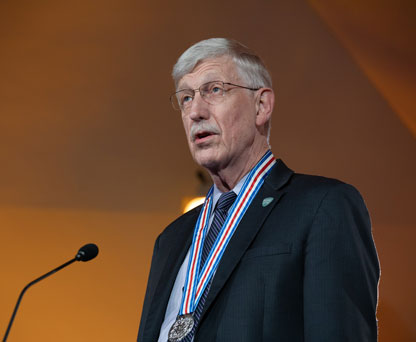Join us in conversation with Dr. Francis Collins, the 2020 Templeton Prize laureate and director of the National Institutes of Health. He recently sat down with Heather Templeton Dill, President of the John Templeton Foundation, to speak about a scientific discovery that filled him with wonder: the moment that he and a colleague identified the genetic defect underlying cystic fibrosis.
‘Getting Chills’
Collins describes his collaboration with Canadian geneticist Lap-Chee Tsui, who had been working independently on an investigation into the origins of cystic fibrosis. On a rainy night in New Haven, Connecticut, on the campus of Yale University, Collins and Tsui returned to their room to find the floor covered with a fax from one of their labs. Within a few moments of looking over the results, Collins knew that they had done it: the answer was in their hands. “I’m getting chills talking about it,” says Collins. “It was a moment of awe, and of thankfulness.”
For Collins, such discoveries are moments when scientists have the privilege of looking for a moment into the intelligence behind the universe — “a glimpse of God’s mind,” as he says, “that we have understood something that God already knew.”
The Perils and Possibilities of Scientific Collaboration
As the leader of one of the country’s largest private research foundations, Dill then asks Collins how he, as director of the National Institutes of Health and leader of the Human Genome Project that decoded human DNA, manages scientific research teams to make them effective.
“They don’t work well if they are shotgun marriages,” quips Collins. “You have to have a compelling goal.” The kind of goal — like unraveling humanity’s genetic code — that is so ambitious and meaningful that people are willing to set aside their individual egos to play as part of a team. Even then, Collins says, keeping people motivated requires clear lines of responsibility, and the occasional “woodshed session” to bring people back on track. It’s also important to ensure that more junior researchers get credit for their contributions to the project, he adds.
Still Curious?
Explore more of the great minds from across the sciences and humanities in our other Speakers Series conversations.
Watch physicist Alan Lightman of MIT describe how he found transcendental meaning in the bottom of a boat.
Watch biologist Stuart Firestein of Columbia University share an exclusive early draft of a book he’s writing which argues that science invented optimism.
Watch economist Tyler Cowen of George Mason University explain how to radically accelerate the process of scientific discovery.
